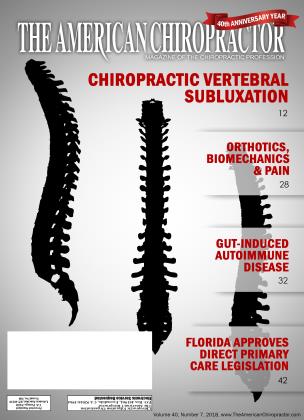Metabolic Endotoxemia in the Development of Autoimmune Disease
INTERNAL HEALTH
Thomas Bayne
According to The National Institutes of Health (NIH), up to 23.5 million Americans currently suffer from one or more autoimmune diseases, and the incidence of autoimmune disease is increasing worldwide by 4 to 7% every year. Though there is no singular cause of autoimmune disease, recent studies suggest that inflammation triggered by endogenous toxins, like endotoxins, may play a significant role in the development of autoimmune conditions.1-3
The primary endotoxin of concern is lipopolysaccharide (LPS). LPS is a major component of the outer cell membrane of gram-negative bacteria in the gut. Trillions of commensal bacteria in the gastrointestinal tract contain LPS and release into the intestinal lumen when they die or lyse. This process happens quite frequently following a meal, but LPS tends to remain neutral and harmless when sequestered inside the intestinal lumen. It is not until LPS reaches the brush border and enters the circulation that it begins to trigger low-grade, systemic inflammation - the breeding ground for autoimmune disease.
Once inside the circulatory system, LPS can trigger innate immune activation and subsequent inflammation anywhere in the body, resulting in a condition known as
metabolic endotoxemia.
Metabolic endotoxemia (ME) is a condition characterized by increased serum endotoxin levels during the first five hours following a meal. High levels of these circulating endotoxins can trigger the release of pro-inflammatory cytokines like interleukin-6, interleukin-1-beta, tumor necrosis factor-alpha, and interferon-gamma, many of which have a strong correlation to autoimmune diseases. For this reason, metabolic endotoxemia may very well be the primary driver of most chronic illnesses plaguing the Western world, including autoimmune disease.
The diversity of the gut microbiome also appears to play a leading role in the development of autoimmune conditions. Low microbial diversity in the gut is associated with increased risk for autoimmune disease and increased incidence of infection.4 One round of broadspectrum antibiotics, for example, can decimate the gut microbiome, decreasing the microbial diversity for up to two years after the medications have left the system.
However, increasing microbial diversity with beneficial bacteria, like Bacterioides fragilis, Faecalibacterium prausnitzii, Akkermansia muciniphila, Bacillus spores, and non-infectious Clostridia spp, can help protect against
^Low microbial diversity in the gut is associated with increased risk for autoimmune disease and increased incidence of infection. JJ
autoimmune disease by up-regulating the T-regulatory system, suppressing TH-17, rebuilding the intestinal mucus layer, and reducing systemic inflammation.5 In this way, reconditioning the gut microbiome can help prevent and correct autoimmune responses within the body.
One of the best ways to recondition the microbiome is with Bacillus spores.6'7 Most probiotics fail because they do not survive gastric passage or colonize well in the large intestine. However, probiotic spores have the natural ability to survive the harsh gastric system and enter the large intestines completely viable. To date, bacterial spores are the only strains that have been shown to treat metabolic endotoxemia.
Probiotic spores in the product MegaSporeBiotic® were the subject of a university, double-blind, and placebo-controlled trial to evaluate the ability of the product to reduce or prevent ME.8 In addition to assessing changes in dietary endotoxemia, the researchers also measured transient changes in cardiovascular disease risk factors, other novel disease risk biomarkers, and the immune system itself, following a high-fat challenge meal.
Healthy volunteers were screened for an endotoxic response to the challenge meal. They consumed the placebo or treatment product for 30 days, without any additional interventions or lifestyle changes. After the 30 days, they received a second challenge meal and were tested for the same biomarkers. The data showed a clear shift to a protective microbiome after just 30 days of supplementation with the spores. The treatment group showed a 60% reduction in circulating endotoxins compared to the placebo group, while the placebo group showed a 32% increase in circulating endotoxins after just 30 days.
These probiotic spores are likely the most promising therapy for metabolic endotoxemia, as no other probiotics or compounds have demonstrated this effect. Collectively, the findings of this study demonstrate a significant blunting of metabolic endotoxemia, triglycerides, and systemic inflammatory markers IL-6, IL-8, MCP-1, IL-1|3 and IL12 following a 30-day period of probiotic supplementation. This study is the first to demonstrate that a short-term spore-based probiotic intervention can alter the dietary endotoxic response in human subjects.
These findings suggest that probiotic spores may play a protective role in the development of autoimmune
conditions and may be a therapeutic addition to current disease interventions.
References
1. Glaros TG, Chang S, Gilliam EA, Maitra U, Deng H, Li L. Causes and consequences of low grade endotoxemia and inflammatory diseases. Front Biosci (Schol Ed). 2013; 5:754-65
2. Maitra U, Deng H. Glaros T, etal. Molecular Mechanisms Responsible for the Selective and Low-Grade Induction of Proinflammatory Mediators in Murine Macrophages by Lipopolysaccharide. Journal of immunology. 2012;89:1014-23.
3. Nakarai H. Yamashita A, Nagayasu S, el al. Adipocyte-macrophage interaction may mediate LPS-induced low-grade inflammation: potential link with metabolic complications. Innate immunity. 2012;18:164-70.
4. Campbell AW. The Gut, Intestinal Permeability, and Autoimmunity. Alt Ther Health Med. 2015;21(1):6-7.155(1): 1-15.
5. Ozdemir O, Goksu-Erol AY. Probiotics for Autoimmune Diseases: Is There a Benefit? Contemporary Pediatrics. 2012:153-180.
6. Hong HA, Due LH, Cutting SM. The use of bacterial spore formers as probiotics. FEMS Microbiology Reviews. 2005;29:813-835.
7. GuaM, Kwang S, Park S. Bacillus subtilis protects porcine intestinal barrier from deoxynivalenol via improved zonula occludens-1 expression. Asian-Australasian Journal of Animal Sciences. 2014;27(4): 580-586.
8. McFarlin BK, Henning AL, Carbajal KM. Oral spore-basedprobiotic supplementation was associated with reduced incidence of post-prandial dietary endotoxin, triglycerides, and disease risk biomarkers. World J Gastrointest Pathophysiol. 2017 Aug 15; 8(3): 117-126.
Thomas Bayne, DC, is a chiropractor who specializes in digestive disorders and autoimmune conditions. He runs PureBalance Natural Family Healthcare Center in Glenview, IL. He combines functional lab assessment with dietary, lifestyle modifications and uses nutritional therapies, herbal medicine, and homeopathy to help patients accomplish their health goals.
 View Full Issue
View Full Issue






